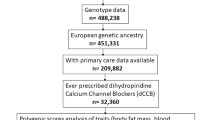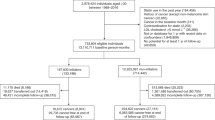Abstract
Calcium channel blockers (CCBs) are commonly prescribed antihypertensives. However, concerns exist about potential off-target effects on cancer. This Mendelian randomization (MR) study examined the associations of genetic proxies for CCBs with the risk of cancer. We used published genetic proxies in the target genes of CCBs as instruments, and obtained MR estimates by applying them to large studies of 17 site-specific cancers (non-Hodgkin lymphoma, melanoma, leukemia, thyroid, rectal, pancreatic, oral cavity/pharyngeal, kidney, esophagus/stomach, colon, bladder, endometrial, cervical and breast, prostate, lung and ovarian cancer) from the Pan-Cancer study, with replication for breast cancer (133,384 cases, 113,789 controls from the Breast Cancer Association Consortium), prostate cancer (79,148 cases, 61,106 controls from the Prostate Cancer Association Group to Investigate Cancer Associated Alterations in the Genome consortium), lung cancer (11,348 cases, 15,861 controls from the International Lung Cancer Consortium), and ovarian cancer (25,509 cases, 40,941 controls from the Ovarian Cancer Association Consortium). We used inverse variance weighting for the main analysis and the weighted median, MR-Egger and Mendelian Randomization Pleiotropy Residual Sum and Outlier as sensitivity analyses. Genetic proxies for CCBs were not associated with any cancer after Bonferroni-correction (at the threshold of p < 0.003). Associations were robust to different MR methods. In conclusion, our study suggests no association of genetic proxies for CCBs with 17 different cancers. While the findings add some support to the safety profile of CCBs in long-term use, future replication is necessary to provide definitive evidence.
This is a preview of subscription content, access via your institution
Access options
Subscribe to this journal
Receive 12 digital issues and online access to articles
$119.00 per year
only $9.92 per issue
Buy this article
- Purchase on Springer Link
- Instant access to full article PDF
Prices may be subject to local taxes which are calculated during checkout

Similar content being viewed by others
Data availability
The summary GWAS statistics can be downloaded from the websites: BCAC (http://bcac.ccge.medschl.cam.ac.uk/bcacdata/), OCAC (http://ocac.ccge.medschl.cam.ac.uk), PRACTICAL (http://practical.icr.ac.uk/blog/), ILCCO (https://ilcco.iarc.fr) consortia and the Pan-Cancer study (https://github.com/Wittelab/pancancer_pleiotropy). UK Biobank summary statistics (https://docs.google.com/spreadsheets/d/1kvPoupSzsSFBNSztMzl04xMoSC3Kcx3CrjVf4yBmESU/edit?ts=5b5f17db#gid=227859291).
Code availability
Available upon request.
References
Zhou B, Bentham J, Di Cesare M, Bixby H, Danaei G, Cowan MJ, et al. Worldwide trends in blood pressure from 1975 to 2015: a pooled analysis of 1479 population-based measurement studies with 19·1 million participants. Lancet. 2017;389:37–55.
Copland E, Canoy D, Nazarzadeh M, Bidel Z, Ramakrishnan R, Woodward M, et al. Antihypertensive treatment and risk of cancer: an individual participant data meta-analysis. Lancet Oncol. 2021;22:558–70.
Chen Q, Zhang Q, Zhong F, Guo S, Jin Z, Shi W, et al. Association between calcium channel blockers and breast cancer: a meta-analysis of observational studies. Pharmacoepidemiol Drug Saf. 2014;23:711–8.
Gandini S, Palli D, Spadola G, Bendinelli B, Cocorocchio E, Stanganelli I, et al. Anti-hypertensive drugs and skin cancer risk: a review of the literature and meta-analysis. Crit Rev Oncol Hematol. 2018;122:1–9.
Cao L, Zhang S, Jia C-M, He W, Wu L-T, Li Y-Q, et al. Antihypertensive drugs use and the risk of prostate cancer: a meta-analysis of 21 observational studies. BMC Urol. 2018;18:17.
Yang H, Yu Y, Hu X, Wang W, Yang X, Liu H, et al. Association between the overall risk of prostate cancer and use of calcium channel blockers: a systematic review and meta-analysis. Clin Ther. 2020;42:1715–27.
Grossman E. Antihypertensive therapy and the risk of malignancies. Eur Heart J. 2001;22:1343–52.
Wu L, Lin W, Liao Q, Wang H, Lin C, Tang L, et al. Calcium channel blocker nifedipine suppresses colorectal cancer progression and immune escape by preventing NFAT2 nuclear translocation. Cell Rep. 2020;33:108327.
Rotshild V, Azoulay L, Zarifeh M, Masarwa R, Hirsh-Raccah B, Perlman A, et al. The risk for lung cancer incidence with calcium channel blockers: a systematic review and meta-analysis of observational studies. Drug Saf. 2018;41:555–64.
Xie Y, Xu P, Wang M, Zheng Y, Tian T, Yang S, et al. Antihypertensive medications are associated with the risk of kidney and bladder cancer: a systematic review and meta-analysis. Aging. 2020;12:1545–62.
Suissa S. Immortal time bias in pharmaco-epidemiology. Am J Epidemiol. 2008;167:492–9.
Battistoni A, Tocci G, Coluccia R, Burnier M, Ruilope LM, Volpe M. Antihypertensive drugs and the risk of cancer: a critical review of available evidence and perspective. J Hypertens. 2020;38:1005–15.
Schooling CM, Freeman G, Cowling BJ. Mendelian randomization and estimation of treatment efficacy for chronic diseases. Am J Epidemiol. 2013;177:1128–33.
Smith GD, Ebrahim S. What can Mendelian randomisation tell us about modifiable behavioural and environmental exposures? BMJ. 2005;330:1076–9.
Gill D, Georgakis MK, Koskeridis F, Jiang L, Feng Q, Wei WQ, et al. Use of genetic variants related to antihypertensive drugs to inform on efficacy and side effects. Circulation. 2019;140:270–9.
Zhao JV, Schooling CM. Using Mendelian randomization study to assess the renal effects of antihypertensive drugs. BMC Med. 2021;19:79.
Walker VM, Kehoe PG, Martin RM, Davies NM. Repurposing antihypertensive drugs for the prevention of Alzheimer’s disease: a Mendelian randomization study. Int J Epidemiol. 2020;49:1132–40.
Evangelou E, Warren HR, Mosen-Ansorena D, Mifsud B, Pazoki R, Gao H, et al. Genetic analysis of over 1 million people identifies 535 new loci associated with blood pressure traits. Nat Genet. 2018;50:1412–25.
Fretheim A, Odgaard-Jensen J, Brørs O, Madsen S, Njølstad I, Norheim OF, et al. Comparative effectiveness of antihypertensive medication for primary prevention of cardiovascular disease: systematic review and multiple treatments meta-analysis. BMC Med. 2012;10:33.
Rashkin SR, Graff RE, Kachuri L, Thai KK, Alexeeff SE, Blatchins MA, et al. Pan-cancer study detects genetic risk variants and shared genetic basis in two large cohorts. Nat Commun. 2020;11:4423.
Sudlow C, Gallacher J, Allen N, Beral V, Burton P, Danesh J, et al. UK biobank: an open access resource for identifying the causes of a wide range of complex diseases of middle and old age. PLoS Med. 2015;12:e1001779.
Kvale MN, Hesselson S, Hoffmann TJ, Cao Y, Chan D, Connell S, et al. Genotyping Informatics and Quality Control for 100,000 Subjects in the Genetic Epidemiology Research on Adult Health and Aging (GERA) Cohort. Genetics. 2015;200:1051.
Zhang H, Ahearn TU, Lecarpentier J, Barnes D, Beesley J, Qi G, et al. Genome-wide association study identifies 32 novel breast cancer susceptibility loci from overall and subtype-specific analyses. Nat Genet. 2020;52:572–81.
Schumacher FR, Al Olama AA, Berndt SI, Benlloch S, Ahmed M, Saunders EJ, et al. Association analyses of more than 140,000 men identify 63 new prostate cancer susceptibility loci. Nat Genet. 2018;50:928–36.
Wang Y, McKay JD, Rafnar T, Wang Z, Timofeeva MN, Broderick P, et al. Rare variants of large effect in BRCA2 and CHEK2 affect risk of lung cancer. Nat Genet. 2014;46:736–41.
Phelan CM, Kuchenbaecker KB, Tyrer JP, Kar SP, Lawrenson K, Winham SJ, et al. Identification of 12 new susceptibility loci for different histotypes of epithelial ovarian cancer. Nat Genet. 2017;49:680–91.
Reicher-Reiss H. Calcium antagonists in heart failure. Eur Heart J. 1988;9:101–4.
Shah S, Henry A, Roselli C, Lin H, Sveinbjornsson G, Fatemifar G, et al. Genome-wide association and Mendelian randomisation analysis provide insights into the pathogenesis of heart failure. Nat Commun. 2020;11:163.
Bowden J, Davey, Smith G, Haycock PC, Burgess S. Consistent estimation in Mendelian randomization with some invalid instruments using a weighted median estimator. Genet Epidemiol. 2016;40:304–14.
Bowden J, Davey Smith G, Burgess S. Mendelian randomization with invalid instruments: effect estimation and bias detection through Egger regression. Int J Epidemiol. 2015;44:512–25.
Verbanck M, Chen CY, Neale B, Do R. Detection of widespread horizontal pleiotropy in causal relationships inferred from Mendelian randomization between complex traits and diseases. Nat Genet. 2018;50:693–8.
Schooling CM, Lopez PM, Yang Z, Zhao JV, Au Yeung SL, Huang JV. Use of multivariable Mendelian randomization to address biases due to competing risk before recruitment. Front Genet. 2021;11:610852.
Schooling CM, Fei K, Terry MB. Reassessing the causal role of early-life adiposity in breast cancer: could the apparent inverse associations be a manifestation of survival bias? Int J Epidemiol. 2023:dyad027. https://doi.org/10.1093/ije/dyad027. Online ahead of print.
Coleman CI, Baker WL, Kluger J, White CM. Antihypertensive medication and their impact on cancer incidence: a mixed treatment comparison meta-analysis of randomized controlled trials. J Hypertens. 2008;26:622–9.
Schooling CM. Selection bias in population-representative studies? A commentary on Deaton and Cartwright. Soc Sci Med. 2018;210:70.
Gill D, Georgakis MK, Walker VM, Schmidt AF, Gkatzionis A, Freitag DF, et al. Mendelian randomization for studying the effects of perturbing drug targets. Wellcome Open Res. 2021;6:16.
Koene RJ, Prizment AE, Blaes A, Konety SH. Shared risk factors in cardiovascular disease and cancer. Circulation. 2016;133:1104–14.
Burgess S, Davies NM, Thompson SG. Bias due to participant overlap in two-sample Mendelian randomization. Genet Epidemiol. 2016;40:597–608.
Minelli C, Del Greco MF, Van Der Plaat DA, Bowden J, Sheehan NA, Thompson J. The use of two-sample methods for Mendelian randomization analyses on single large datasets. Int J Epidemiol. 2021;50:1651–9.
Freeman G, Cowling BJ, Schooling CM. Power and sample size calculations for Mendelian randomization studies using one genetic instrument. Int J Epidemiol. 2013;42:1157–63.
Burgess S, Davey Smith G, Davies NM, Dudbridge F, Gill D, Glymour MM, et al. Guidelines for performing Mendelian randomization investigations. Wellcome Open Res. 2020;4:186.
Acknowledgements
The authors thank consortia and study participants for sharing the data.
Author information
Authors and Affiliations
Contributions
JVZ generated the idea and designed the study. BHF conducted the analysis and interpreted the results with the help of JVZ. BHF drafted the paper, JVZ and CMS critically revised the paper, and all authors reviewed and approved the final version.
Corresponding author
Ethics declarations
Competing interests
The authors declare no competing interests.
Additional information
Publisher’s note Springer Nature remains neutral with regard to jurisdictional claims in published maps and institutional affiliations.
Supplementary information
Rights and permissions
Springer Nature or its licensor (e.g. a society or other partner) holds exclusive rights to this article under a publishing agreement with the author(s) or other rightsholder(s); author self-archiving of the accepted manuscript version of this article is solely governed by the terms of such publishing agreement and applicable law.
About this article
Cite this article
Fan, B., Schooling, C.M. & Zhao, J.V. Genetic proxies for calcium channel blockers and cancer: a Mendelian randomization study. J Hum Hypertens 37, 1028–1032 (2023). https://doi.org/10.1038/s41371-023-00835-9
Received:
Revised:
Accepted:
Published:
Issue Date:
DOI: https://doi.org/10.1038/s41371-023-00835-9



